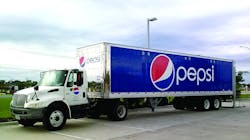Manager: Kevin Willis, SC fleet associate leader
Company: New Bern Transport Co., a subsidiary of PepsiCo Inc.
Operation: A fleet of 38,000 assets, including 9,500 tractors, 11,500 trailers, and 17,000 assorted vehicles
PROBLEM
Winter is always tough on trucking equipment with snow, ice, and chilly temperatures taking a toll on vehicles. One aftereffect of winter weather that can cause fleet managers a lot of headaches is corrosion, which is caused by deicing chemicals such as magnesium chloride and liquid salt brine mixtures concocted as a pretreatment solution to help prevent snow and ice from sticking to the roads.
Those two substances gradually corrode all sorts of metals and electrical wires, leading to costly repairs, expensive downtime, and reduced vehicle life cycles, says Kevin Willis, SC fleet associate leader with New Bern Transport, a subsidiary of PepsiCo.
“Magnesium chloride is especially harsh on galvanized steel,” he explains, noting that trucks and trailers operating in saltwater coastal regions also experience corrosion similar to their brethren based in tough winter locales such as Maine.
Although truck and trailer OEMs add anti-corrosion coatings during the manufacturing process, magnesium chloride and salt brine still win out over the long term.
SOLUTION
According to New Bern’s calculations, corrosion costs the company some $500 per tractor per year in repair costs and vehicle downtime, with 25% of the cost attributed to repairing/replacing items such as battery cables, lighting systems, and other electrical accessories.
To reduce those costs, New Bern settled on a two-step “clean and seal” program for its vehicles that is conducted at least once a year per unit.
Handled by a third party, the cleaning part of the clean and seal process involves lightly washing vehicles and trailers with soap and water stem to stern.
“We don’t pressure wash or steam clean them in any way during this process,” Willis says. “That actually drives any chemicals like magnesium chloride farther up into the chassis and frame and around the seals and wires of electrical assemblies.”
Once a vehicle or trailer is clean and dry, it’s driven onto a plastic mat before a corrosion inhibitor is applied. The substance, which resembles vegetable oil in terms of composition and smell, forms a gelatinous seal that keeps out deicing chemicals and other corrosive substances.
The inhibitor is sprayed under the vehicle or trailer, with particular attention paid to any areas with exposed wiring. For vehicles, the substance is sprayed into the door frame channels where liquids can settle. Willis says the inhibitor needs to be reapplied every year because it wears off.
About the Author
Sean Kilcarr
Editor in Chief
Sean Kilcarr is a former longtime FleetOwner senior editor who wrote for the publication from 2000 to 2018. He served as editor-in-chief from 2017 to 2018.
